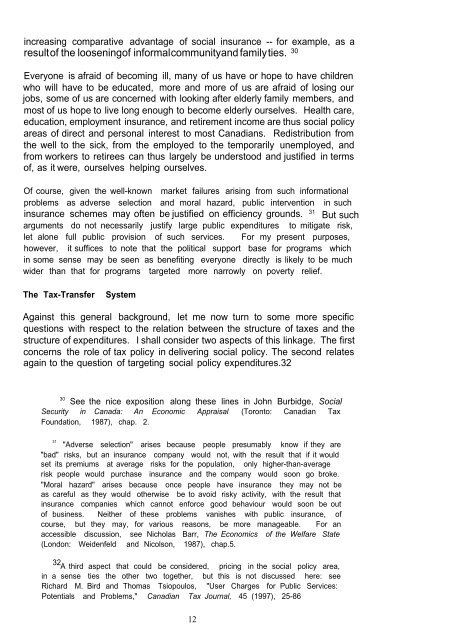Richard Bird - Institute for Public Economics - University of Alberta
Richard Bird - Institute for Public Economics - University of Alberta
Richard Bird - Institute for Public Economics - University of Alberta
Create successful ePaper yourself
Turn your PDF publications into a flip-book with our unique Google optimized e-Paper software.
increasing comparative advantage <strong>of</strong> social insurance -- <strong>for</strong> example, as aresult<strong>of</strong> the loosening<strong>of</strong> in<strong>for</strong>malcommunityand familyties. 30Everyone is afraid <strong>of</strong> becoming ill, many <strong>of</strong> us have or hope to have childrenwho will have to be educated, more and more <strong>of</strong> us are afraid <strong>of</strong> losing ourjobs, some <strong>of</strong> us are concerned with looking after elderly family members, andmost <strong>of</strong> us hope to live long enough to become elderly ourselves. Health care,education, employment insurance, and retirement income are thus social policyareas <strong>of</strong> direct and personal interest to most Canadians. Redistribution fromthe well to the sick, from the employed to the temporarily unemployed, andfrom workers to retirees can thus largely be understood and justified in terms<strong>of</strong>, as it were, ourselves helping ourselves.Of course, given the well-known market failures arising from such in<strong>for</strong>mationalproblems as adverse selection and moral hazard, public intervention in such31insurance schemes may <strong>of</strong>ten be justified on efficiency grounds. But sucharguments do not necessarily justify large public expenditures to mitigate risk,let alone full public provision <strong>of</strong> such services. For my present purposes,however, it suffices to note that the political support base <strong>for</strong> programs whichin some sense may be seen as benefiting everyone directly is likely to be muchwider than that <strong>for</strong> programs targeted more narrowly on poverty relief.The Tax-TransferSystemAgainst this general background, let me now turn to some more specificquestions with respect to the relation between the structure <strong>of</strong> taxes and thestructure <strong>of</strong> expenditures. I shall consider two aspects <strong>of</strong> this linkage. The firstconcerns the role <strong>of</strong> tax policy in delivering social policy. The second relatesagain to the question <strong>of</strong> targeting social policy expenditures.3230See the nice exposition along these lines in John Burbidge, SocialSecurity in Canada: An Economic Appraisal (Toronto: Canadian TaxFoundation, 1987), chap. 2.31"Adverse selection" arises because people presumably know if they are"bad" risks, but an insurance company would not, with the result that if it wouldset its premiums at average risks <strong>for</strong> the population, only higher-than-averagerisk people would purchase insurance and the company would soon go broke."Moral hazard" arises because once people have insurance they may not beas careful as they would otherwise be to avoid risky activity, with the result thatinsurance companies which cannot en<strong>for</strong>ce good behaviour would soon be out<strong>of</strong> business. Neither <strong>of</strong> these problems vanishes with public insurance, <strong>of</strong>course, but they may, <strong>for</strong> various reasons, be more manageable. For anaccessible discussion, see Nicholas Barr, The <strong>Economics</strong> <strong>of</strong> the Welfare State(London: Weidenfeld and Nicolson, 1987), chap.5.32 A third aspect that could be considered, pricing in the social policy area,in a sense ties the other two together, but this is not discussed here: see<strong>Richard</strong> M. <strong>Bird</strong> and Thomas Tsiopoulos, "User Charges <strong>for</strong> <strong>Public</strong> Services:Potentials and Problems," Canadian Tax Journal, 45 (1997), 25-8612



